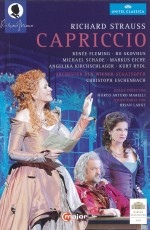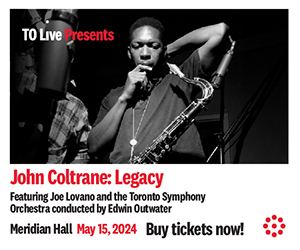 Strauss – Capriccio
Strauss – Capriccio
Fleming; Skovhus; Schade; Eiche; Kirchschlager; Rydl; Wiener Staatsoper; Marco Arturo Marelli
Cmajor 715908
Fresh from the rapture of watching this video performance of Strauss’ last utterance in opera and recovering from the delirium of the standing ovation, can I silence the skeptics who believe that opera is dead and totally irrelevant in our age? “They should eat their words” (to quote Bruce Surtees) after seeing this production from the Wiener Staatsoper. This venerable opera house actually just recently produced at least two phenomenal successes including this one and a stupendous Anna Bolena.
Richard Strauss, a genius who managed to revamp his earlier, very successful sturm und drang hyper-romantic style towards an almost Mozartian restraint and elegant classicism without losing his tremendous gifts of melody, advanced harmonies and overall structural control of his material, is now 150 years old (I use the present tense to emphasize just how alive he is to me through his music). To celebrate this landmark Vienna chose this, his most difficult and problematic opera, not Salome nor Der Rosenkavalier, but Capriccio, taking an enormous chance.
The heroine, Renée Fleming as the Countess, pretty well owns this crown jewel of a role and there is no match for her presently. She had a difficult start as she is not getting any younger, but she soars, grows in stature and achieves heights in the last scene where even the Gods would fear to tread. Canadian tenor Michael Schade and German baritone Markus Eiche, the frustrated would-be lovers, are no disappointment either, but Angelika Kirschlager (mezzo) with her perfect German diction, wonderful stage presence, charming voice and sense of humour certainly gives Fleming a run for her money. Kurt Rydl, in the comic role of the busybody schauspieldirektor, certainly lives up to his reputation as one of the great character basso-buffos of today. Swedish baritone Bo Shovkus is a bit outlandish in the role of the Count, but adds a lot of interest to the character and his voice is excellent. In his Wiener Staatsoper premiere, Christoph Eschenbach is in masterly control and gets able support from his virtuoso musicians. Special credit is due to the young violinists in the opening very difficult string sextet and to the wonderful horns in the famous “Moonlight Intermezzo.”
Director Marco Arturo Marelli’s concept is surprisingly grandiose for this intimate, chamber-like opera, but the resplendent sets of a Rococo palace in vibrant, opulent colours of blue and silver, translucent furnishings and abundance of mirrors never cease to delight the eye. All the foregoing notwithstanding it is the underlying abundance of talent, good taste, charm and Viennese gemütlichkeit which carry the day and the birthday boy, Maestro Strauss, the big winner.



